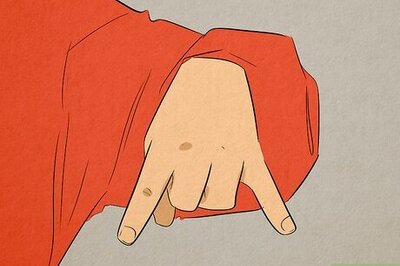
views
Manama: Libyan ruler Muammar Gaddafi faced the biggest challenge of his rule on Saturday amid reports that dozens of people have been killed as an offer by Bahrain's king of national dialogue to end the crisis there was rebuffed by the opposition.
Violence has spread from Tunisia and Egypt to Bahrain, Libya, Yemen and Djibouti, presenting the United States with the dilemma of maintaining stability in the oil-rich region while upholding the right to demonstrate for democratic change.
Protests in Libya's second city of Benghazi on Friday against Gaddafi's four decades in power were unprecedented with Amnesty International saying 46 people had been killed in a three-day crackdown.
Funerals of dead protesters could act as further flashpoints for demonstrators emboldened by uprisings in neighbouring Tunisia and Egypt that toppled long-ruling presidents.
"Special forces who have a very strong allegiance to Gaddafi are still fighting desperately to gain to control, to gain ground and the people are fighting them street by street," said a resident of Benghazi identified as Mohammed by the BBC.
The broadcaster said residents in Benghazi reported there was no electricity in parts of the city and that tanks were stationed outside the court building.
Analysts say a key difference between Libya and Egypt is that Gaddafi has oil cash to smooth over social problems.
Gaddafi is also respected in much of the country, though less so in the Cyrenaica region around Benghazi.
"For sure there is no national uprising," said Noman Benotman, a former opposition Libyan Islamist who is based in Britain but is currently in Tripoli.
"I don't think Libya is comparable to Egypt or Tunisia. Gaddafi would fight to the very last moment," he said by telephone from the Libyan capital.
The spreading contagion of unrest -- particularly worries about its possible effects on the world No. 1 oil producer, Saudi Arabia, helped drive Brent crude prices higher this week before other factors caused them to slip on Friday.
It was also a factor in gold prices posting their best weekly performance since December.
Bahrain's king offered a national dialogue "with all parties" in a conciliatory move to resolve a crisis that has killed six people since it began and wounded hundreds. But the main Shi'ite bloc rejected the offer.
"We don't feel there is a serious will for dialogue because the military is in the streets," Ibrahim Mattar, a member of Wefaq, the main Shi'ite opposition bloc which quit parliament on Thursday, told Reuters.
More than 60 people were in hospital on Saturday undergoing treatment for wounds sustained when Bahraini security forces fired on protesters as they headed to Pearl Square on Friday. Wefaq said one of the wounded was in extremely critical condition.
The shootings occurred on a day of mass mourning when Shi'ites buried the four people killed a day earlier in the police raid on the Pearl Square traffic circle.
US President Barack Obama spoke with the king on Friday evening, condemning the violence and urging the government to show restraint. Obama said the stability of Bahrain, home to the US Middle East fleet, depended upon respect for the rights of its people, according to the White House.
In neighbouring Yemen, security forces and pro-government loyalists clashed with crowds demanding an end to President Ali Abdullah Saleh's 32-year rule in several cities on Friday. At least five people were killed and dozens wounded.
Doctors said four people died from gunfire in the southern port of Aden, where resentment against rule from Sanaa runs high. One was killed by a grenade in Taiz, Yemen's second city.
At least 11 people were wounded in Aden, where thousands of protesters angered by what they said was excessive force by security forces stayed in the streets for hours.
Hundreds of protesters later staged a sit-in in the centre of Aden to protest against the killing of demonstrators.
Saleh, a US ally against a Yemen-based al Qaeda wing that has launched attacks at home and abroad, is struggling to end month-old protests flaring across his impoverished country.
Tens of thousands of dissidents also thronged the city of Taiz, 200 km (130 miles) south of Sanaa, the capital. One was killed and 28 were wounded, three critically, when a hand grenade thrown from a car exploded in the crowd, doctors said.
Anti-government protesters watched over by riot police took to the streets of Djibouti city after Friday afternoon prayers calling for President Ismail Omar Guelleh, whose family has held sway in the small Horn of Africa nation of Djibouti since independence from France in 1977, to step down, media reported.
Guelleh took office in 1999 and is expected to run for a third term when his mandate expires in April 2011.
Djibouti, a former French colony which separates Eritrea from Somalia, hosts France's largest military base in Africa and a major US base. Its port is used by foreign navies patrolling busy shipping lanes off the coast of Somalia to fight piracy. Unemployment runs at about 60 per cent.


















Comments
0 comment